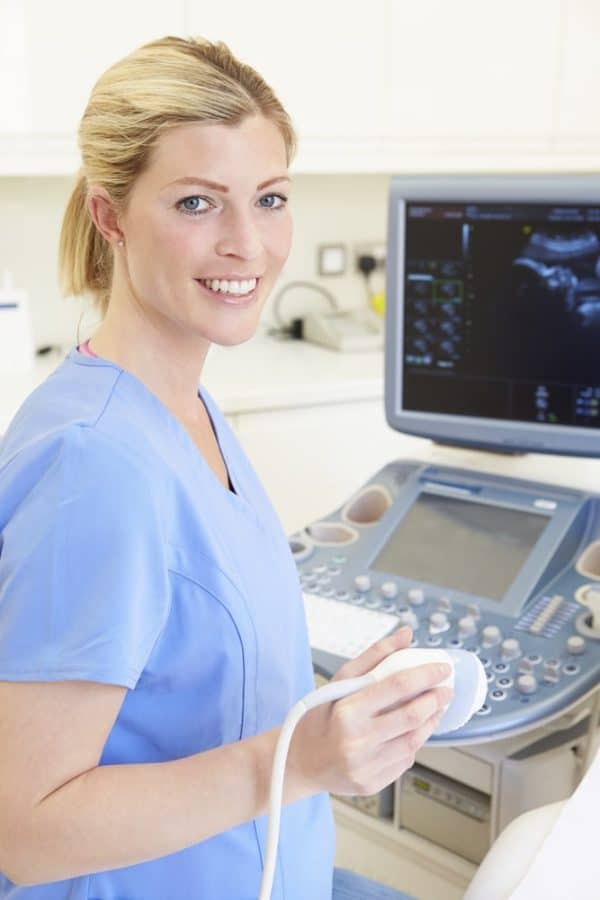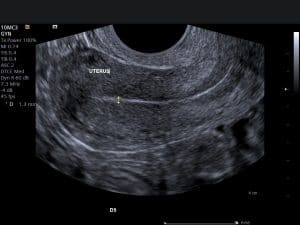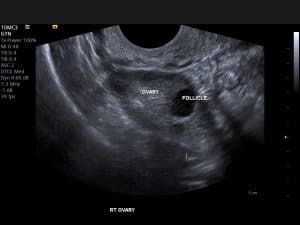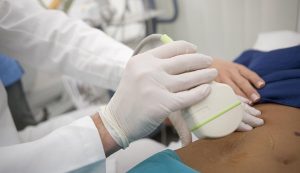Antral Follicle Count (AFC) Scan in London
An antral follicle count scan is one of the most accurate ways to assess a woman’s ovarian reserve. It measures the number of small resting follicles in the ovaries at the start of a menstrual cycle, helping fertility specialists plan the most effective treatment approach.
At International Ultrasound Services in London, the scan is performed by highly experienced consultant sonographers and radiologists who specialise in reproductive ultrasound. Whether you are planning IVF, exploring fertility preservation, or simply want to understand your fertility potential, an AFC scan provides detailed, immediate, and reliable information.
Appointments are available on the same day, including evenings and weekends. Results are discussed with you straight after the scan and can be sent directly to your fertility clinic.

Genuine 5 Star Google Reviews from 300+ patients
AFC Ultrasound Appointments
What is an Antral Follicle Count Scan?
The antral follicle count is measured using transvaginal ultrasound during the early part of the menstrual cycle. The scan identifies and counts the small fluid-filled sacs—called antral follicles—present in each ovary. These follicles contain immature eggs that could develop in future cycles.
The number of antral follicles correlates closely with ovarian reserve, which is the capacity of the ovaries to produce eggs capable of fertilisation. A higher count usually means a greater reserve, while a lower count suggests a reduced number of eggs remaining.
This information is essential for fertility planning, as it helps determine the likely response to ovarian stimulation medication and guides treatment choices.
Who Should Have an AFC Scan?
An AFC scan can be helpful for many situations, including:
Women planning IVF, ICSI, or other assisted reproductive treatments.
Those with irregular menstrual cycles or suspected diminished ovarian reserve.
Women over 35 who want to understand their fertility potential before trying to conceive.
Patients diagnosed with or suspected of having polycystic ovary syndrome (PCOS).
Individuals considering egg freezing for fertility preservation.
Women who have had previous fertility treatments with a poor ovarian response.
In many fertility clinics, an AFC scan is a standard part of the initial work-up, often combined with an AMH (Anti-Müllerian Hormone) blood test for a more complete picture of ovarian reserve.
How the AFC Scan is Performed
Timing of the Scan
The scan is best performed in the early follicular phase of the cycle, usually between day 2 and day 5 of menstruation. This timing ensures that the follicles counted are at a resting stage, providing a true reflection of the ovarian reserve.
Step-by-Step Process
On arrival, you will be welcomed and shown to a private ultrasound room. The sonographer will explain the procedure and answer any questions before starting.
The scan is usually performed transvaginally, as this approach gives the clearest and most accurate view of the ovaries. A slim, covered, and lubricated ultrasound probe is gently inserted a short distance into the vagina. The examination typically takes around 5–10 minutes.
If a transvaginal scan is not suitable for you, an abdominal scan can be offered, although image clarity is generally better with the transvaginal method.
Measurements Taken
The sonographer will:
Count the number of antral follicles in each ovary.
Record the size of the ovaries.
Assess the uterus and endometrium if requested.
Note any abnormalities that might require further investigation.
Follicle Tracking vs. Antral Follicle Count (AFC)
It's common to wonder about the difference between these two important fertility scans. They answer two different, but related, questions:
Follicle Tracking (This Scan): A dynamic process over one cycle that answers the question: "When will I ovulate?"
Antral Follicle Count (AFC): A static one-off scan, performed on days 2-5 of your cycle, that answers the question: "What is my ovarian reserve (egg count)?"
While follicle tracking monitors your ovulation in real-time, an Antral Follicle Count (AFC) Scan provides a crucial snapshot of your overall fertility potential.
Why the AFC Scan is Important in Fertility Assessment
The antral follicle count is a key predictor of how your ovaries are likely to respond to fertility medication.
A low count may suggest that higher doses of medication will be needed for ovarian stimulation.
A high count could indicate an increased risk of over-response, which is relevant in conditions such as PCOS.
A study published in Fertility and Sterility confirmed that AFC is a reliable and reproducible test for predicting ovarian response in IVF cycles. Another study in the European Journal of Obstetrics & Gynecology and Reproductive Biology found that AFC correlates strongly with the number of eggs retrieved during stimulation.
By combining AFC with AMH levels, fertility specialists can make more personalised and effective treatment decisions, improving the chances of success and reducing risks.

Why Choose International Ultrasound Services for Follicle Tracking in London
Patients choose International Ultrasound Services for several reasons:
Specialist expertise – scans are performed by consultant-level sonographers and radiologists with years of experience in reproductive ultrasound.
Fast access – same-day and weekend appointments are available, ensuring your treatment is never delayed.
Collaborative care – results are shared directly with your fertility clinic in the required format.
Comprehensive facilities – both transvaginal and abdominal scanning available in a private, comfortable setting.
Convenient location – easily accessible London clinic with excellent transport links.
Price of Antral Follicle Count Scan
The AFC scan is priced at £159 and includes:
Comprehensive ultrasound examination.
Same-day explanation of results.
Full written report with images.
Option to send results directly to your fertility clinic.
Related Fertility Scans
International Ultrasound Services also offers:
Follicle Tracking Ultrasound – to monitor follicle growth and predict ovulation.
Pelvic Ultrasound – for general gynaecological health assessment.
Early Pregnancy Scan – to confirm pregnancy after fertility treatment.
- N Z1/29/2026I had a positive and impressive experience with Dr.Mo and the lovely nurse, at first he makes you feel comfortable and patient enough to give you your full-time to talk, ask and receive all the needed information, explaining what goes on the ultrasound clearly, and ask you if you need to know or want ask anything, not rushed and feel unwelcomed, this is the kind of doctors we like to see, and the pleasant way to be treated.Read MoreRead Lessathena1/29/2026Highly professional and compassionate specialists. I felt completely at ease during the entire procedure and received a thorough and clear medical explanation.Read MoreRead LessArooba Tahir1/24/2026All the staff were very nice and super helpful! Especially Dr Mo and Roshni !They answered all the questions my sister had and took their time with the ultrasound, ensuring she was at ease at all times! Would highly recommend! Thank you again !Read MoreRead Less
- Laura Kirkwood1/14/2026Tharek is very professional and answered my questions clearly to ensure I understood all the information.Read MoreRead LessIan Howard12/18/2025Friendly and efficient staff, in an accessible location, close to Notting Hill Tube. All of which is icing to the cake of a professional and highly competent scanning service. Highly recommended.Read MoreRead LessMarley Byng12/10/2025Quick, easy, clean service. Report written up straight after the scan. Tareq was super knowledgable and friendly. Highly recommend for anyone needing a quick scan/advice.Read MoreRead Less
Understanding Your Results
Your results will be explained to you immediately after the scan. The written report will include:
The number of antral follicles in each ovary.
Ovarian size and appearance.
Any relevant findings in the uterus or pelvic area.
The interpretation of the count varies slightly between clinics, but as a general guide:
Low ovarian reserve – fewer than 5 follicles in total.
Average ovarian reserve – around 6–10 follicles in total.
High ovarian reserve – more than 12 follicles in total, often seen in PCOS.
Your fertility specialist will use this information alongside other tests to plan your treatment.
How to Prepare for Your AFC Scan
Preparation is minimal. For a transvaginal scan, a full bladder is not necessary. Wear comfortable clothing and bring any referral forms, previous ultrasound reports, or relevant medical information. If you are tracking your cycle, note the first day of your last period to ensure the scan is timed correctly.
Frequently Asked Questions
When is the best time to have an AFC scan?
Between day 2 and day 5 of your menstrual cycle for the most accurate count.
Can an AFC scan predict fertility?
It cannot predict natural conception directly but provides a strong indication of ovarian reserve and treatment response.
Does a high AFC mean PCOS?
Not always, but a high count can be a feature of PCOS. Other tests are needed for diagnosis.
Do I need an AMH test as well?
Many fertility clinics recommend combining AFC with AMH for a complete ovarian reserve assessment.
Is the scan painful?
Most women find the transvaginal scan comfortable, with only mild pressure if any.
Content Information
We review all clinical content annually to ensure accuracy. If you notice any outdated information, please contact us at info@iuslondon.co.uk.
About the Author:

Yianni is a highly experienced sonographer with over 21 years in diagnostic imaging. He holds a Postgraduate Certificate in Medical Ultrasound from London South Bank University and is registered with the Health and Care Professions Council (HCPC: RA38415). Currently working at Barts Health NHS Trust, Yianni specialises in abdominal, gynaecological, and obstetric ultrasound. He is a member of the British Medical Ultrasound Society (BMUS), Society of Radiographers (SoR) and regularly contributes to sonographer and junior radiologists training programs.
Other Ultrasound Scans for Women we offer:
We offer a large selection of ultrasound scans for women in London.
Fertility Health Insights
Pelvic Infections: Causes and Prevention
Pelvic Infections or Pelvic Inflammatory Disease (PID), is a term...
Read MoreSymptoms Of Ovarian Cysts
The symptoms of ovarian cysts are much more common in today’s...
Read MorePelvic Ultrasound FAQs
The pelvic ultrasound is a diagnostic scan exam to evaluate the organs and...
Read MoreUnderstanding pelvic ultrasound reports
Pelvic Ultrasound Results Explained. If you had a pelvic ultrasound...
Read MoreUltrasound for Gynaecological Conditions: A Patient's Guide
Ultrasound is a type of imaging that uses sound waves...
Read MorePolycystic Ovary Syndrome (PCOS) and the Role of Follicular Scans
Polycystic ovary syndrome (PCOS) is a common hormonal disorder that...
Read MorePelvic Ultrasound for Abnormal Bleeding
Experiencing abnormal bleeding can be distressing, and understanding what may...
Read MorePelvic Ultrasound for IUD Localization: Understanding the Process, Purpose, and Benefits
Pelvic ultrasound is a primary tool for determining the exact...
Read MoreOvarian Cancer and Pelvic Ultrasound
Ovarian cancer is a complex and often silent disease, making...
Read MoreWhy you should have a pelvic ultrasound when CA 125 is raised.
Ovarian cancer often presents challenges for early diagnosis because its...
Read More

















